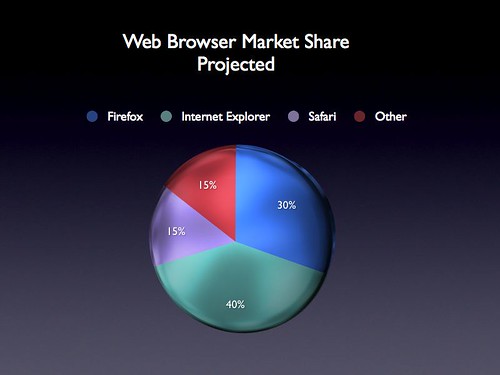John Battelle asked Steve Berkowitz and Jim Lanzone where Google was vulnerable at the Web 2.0 conference on Wednesday. Either they knew and weren't sharing or they really didn't know the answer because neither gave good answers. I'm going to think the former. Let me tell you what I think and I'll answer this in three parts.
Part 1
The main components of a general Web search engine are: speed, relevancy, and comprehensiveness. Mastering these elements make for a great search engine/great search product. These characteristics were defined a good while ago. Speed is speed. Relevancy has a lot of leeway and has much room for improvement. Comprehensiveness is how good and complete (breadth/size) is your data source as well as what vertical searches you offer e.g. government search, subject specific search, map search, local search, etc.
What makes up the rest of a search engine is marketing and distribution.
Part 2
I'm a big Google fan for various reasons. One of the biggest reasons is Google gets it. What Google delivers in their search results is the Internet. What I mean is when I search for something, say directions, I get results from Google Maps, MapQuest, and Yahoo! Maps because that's what I was looking for. In contrast, when searching Yahoo!, it's about Yahoo! services first, then the Internet second; same with AOL Search and Live.com. (It's called driving recirculation.) I'm not sure if the search engines get it. This is also the "I can't put a finger on why I like Google, but I like Google a lot." Well it's because they're giving you or like to make you think that what they're giving you is the Web.*
Google also understands how the game is played. It's an ops game and Google understand ops. They also understand the fundamental concept of referrals and how the Web is a referral monster, in other words, ad machine.
Finally, there are a lot of "haters" out there now. It's just human nature. But what I'd prefer to see is that people take note of what Google is doing and really step up to the plate. It's not just copying their homepage to make it simple and clean, it's about copying some of the same values.
Part 3
Google is vulnerable in several places:
1) International, they aren't globally dominant. Other search engines are better than Google and Yahoo! in other areas of the world. In country companies have a distinct advantage just because Google is a US based company. Also note that the ad market is great in the US and in some other countries but isn't as mature and isn't the same structure in many countries.
2) Distribution. At the end of they day, Google still has to go through Firefox or Internet Explorer or some other browser or some other client. The food chain is PC, OEM/ISP, Browser, then Search engines and web sites.
3) Completeness. Google can get locked out of various markets because they may not have access to the data or content. Let's say Yahoo! or MSFT buys NAVTEQ, the content provider for Google Maps and every Maps service around. Guess who's up a creek.
—
* This may change as Google starts hosting more and more content. They may start giving preferential treatment to their own services and content. They may also give this preferential treatment unknowingly by working with the content folks they acquire e.g. blogger, YouTube and helping them optimize for the Google search algorithms. If we see "recirculation" coming out of Google, that may be the start of their decline as a preferred engine and opens up the opportunity for someone else.



